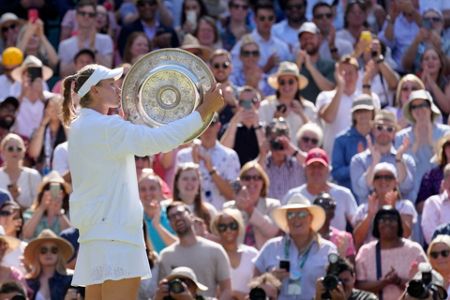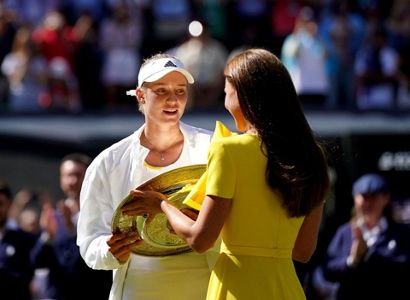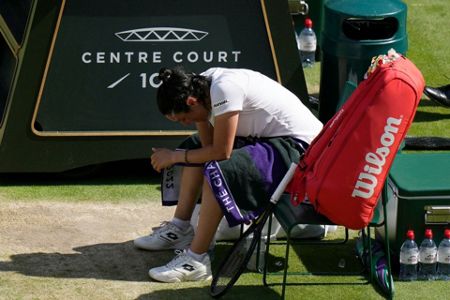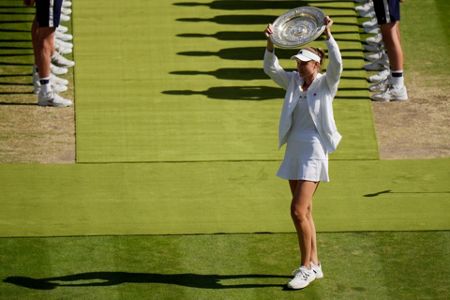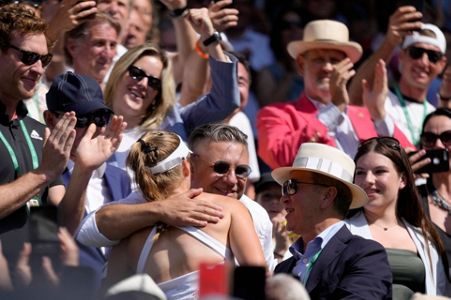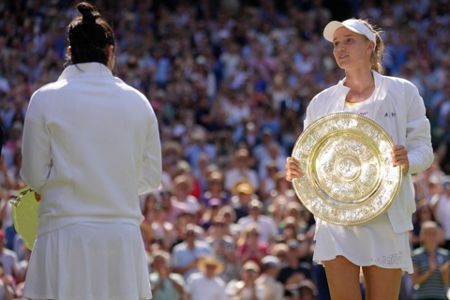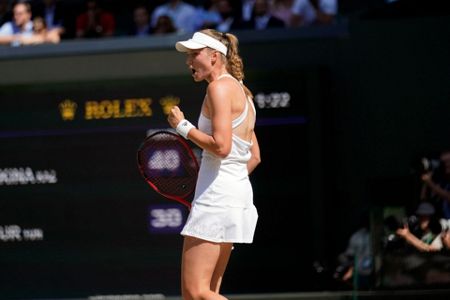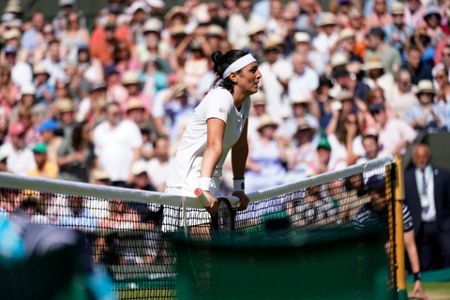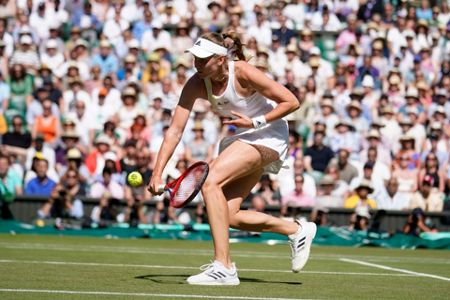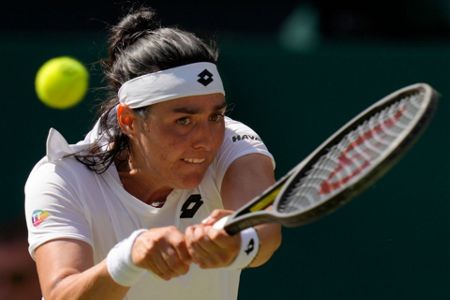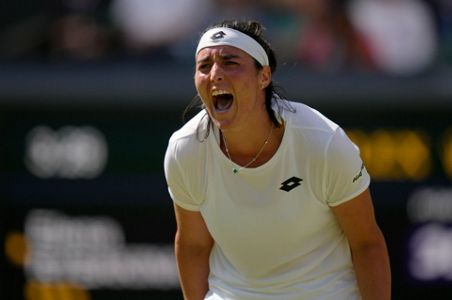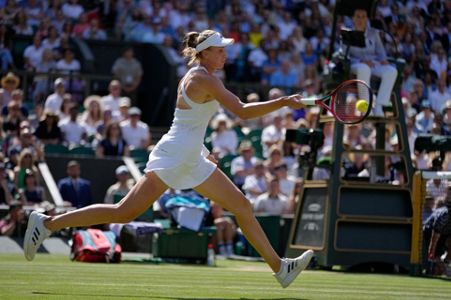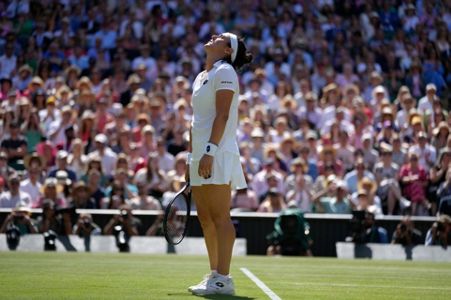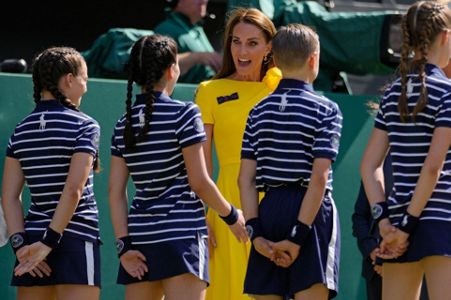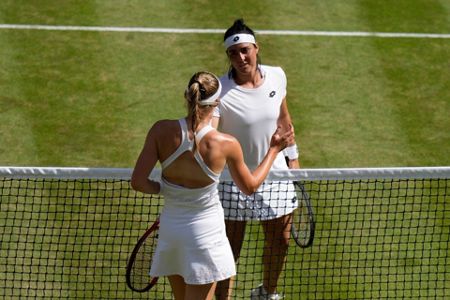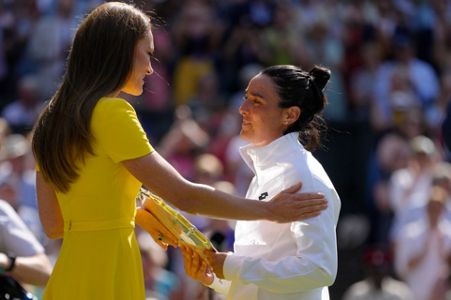WIMBLEDON, England (AP) — As “unexpectable” and “unbelievable” as Elena Rybakina found her Wimbledon championship to be and as “super happy” as she was about winning a Grand Slam title at age 23 and ranked 23rd, her immediate reaction to grabbing the last point of the final Saturday was as muted as possible.
She exhaled. She walked to the net to shake the hand of her opponent, No. 2-ranked Ons Jabeur. She allowed herself only the slightest of smiles as she looked up to glance at the excitement in the Centre Court guest box. No screams of joy. No jumps in the air. No collapse onto the grass.
“I need to teach her,” the effusive Jabeur noted later, “how to celebrate really good.”
It was not until more than two hours after the conclusion of her 3-6, 6-2, 6-2 victory over the No. 2-ranked Jabeur that Rybakina was overcome by the significance of it all, including earning the first singles trophy at a major tournament for her adopted country of Kazakhstan.
That moment of realization came when, during a news conference filled with questions about her lack of outward expression on court, a reporter asked what Rybakina thought her parents' reaction would be to this triumph. They were not on hand Saturday; she had not spoken to them yet.
“Probably,” she said, her eyes welling with tears, her face reddening, her hand placed over her mouth, “they’re going to be super proud.”
And then, after a pause, Rybakina joked: “You wanted to see emotion!”
This was the first Wimbledon women's final since 1962 between a pair of players both making a debut in a Grand Slam title match, and Rybakina acknowledged being nervous at the start. When she stepped into the sunshine filling the 100-year-old stadium, she did not wave to the spectators, the way Jabeur did. Instead, Rybakina kept a firm double-grip on the black-and-red straps of the racket bag slung over her shoulders.
And it was Jabeur who played better in the early going, handling Rybakina's strong serve and groundstrokes to break for a 2-1 edge.
Rybakina’s miscues mounted. A volley into the net tape with the full court wide open. A netted forehand after Jabeur barely got a short return in. When another forehand off Rybakina's red racket went awry, Jabeur broke at love to take the opening set, yelled “Yalla!” — Arabic for “Let’s go!” — and threw an uppercut as she walked to the sideline.
Jabeur, a 27-year-old from Tunisia, entered on a 12-match winning streak, all on grass courts, and was trying to become the first Arab or African woman to win a Slam singles title in the professional era, which dates to 1968.
“I just try to inspire as many generations as I can,” said Jabeur, who had stored a photo of the Wimbledon women's singles trophy on her phone for inspiration. “I hope they’re not really disappointed, but I’ll try my best next time.”
Rybakina was born in Moscow and has represented Kazakhstan since 2018, when that country offered her funding to support her tennis career. The switch has been a topic of conversation during Wimbledon, because the All England Club barred athletes who represent Russia or Belarus from entering the tournament due to the war in Ukraine.
The women's and men's tennis tours responded to that by withholding all ranking points from Wimbledon, meaning Rybakina will not get the bump up she would have in any other year.
“I didn’t choose where I was born,” Rybakina said. “People believed in me. Kazakhstan supported me so much.”
Since the WTA computer rankings began in 1975, just one woman ranked lower than Rybakina has won Wimbledon — Venus Williams in 2007 at No. 31, although she had been No. 1 and already won three of her five career Wimbledon trophies.
Be the second set, Rybakina, who beat Serena Williams at last year’s French Open, began showing why she leads the tour in aces in 2022, why, as she put it, “It's effortless, the power I have.”
Her first break chance finally arrived more than an hour in, and Rybakina converted it to go up 1-0 when Jabeur missed a forehand. After saving four break points over her next two service games, Rybakina broke again and soon led 5-1.
“I didn’t play my best tennis, let’s say, second and third set,” said Jabeur, who leads the women's tour with 13 victories in three-setters this year. “She started to be more aggressive. I think she stepped in the court much more and put a lot of pressure on me.”
Hitting her flat forehands deep into the court, never quite allowing Jabeur to regain her rhythm, Rybakina broke to begin the third. There was one last crucial moment: Jabeur, who uses as many spins and slices and variety as anyone in the game, parlayed a drop shot and a lob into love-40 on Rybakina’s serve.
But Rybakina took the next five points, aided by a couple of 119 mph serves, to go up 4-2, then quickly broke again.
“Frustrating,” Jabeur said.
Not much later, it was over.
“I didn’t know what to do. It was shocking,” Rybakina said, explaining that she was so “in shock” she didn't hear half of what the Duchess of Cambridge told her during the trophy ceremony.
“Maybe one day you will see huge reaction from me,” she said with a smile, “but unfortunately not today.”
Rybakina acknowledged afterward she didn't expect to get to the fortnight's second week, let alone the final weekend.
Now she is, and forever will be, a Grand Slam champion.
“It's difficult to describe now how I feel. But for sure, I’m going to remember these two weeks, especially today, forever,” Rybakina said. “I mean, it’s just something I will never forget.”
___
More AP Wimbledon coverage: https://apnews.com/hub/wimbledon and https://apnews.com/hub/tennis and https://twitter.com/AP_Sports
Copyright 2022 The Associated Press. All rights reserved. This material may not be published, broadcast, rewritten or redistributed without permission.





